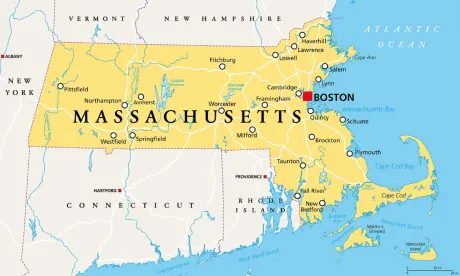On October 4, 2023, Massachusetts enacted a new law called “An Act to improve the Commonwealth’s competitiveness, affordability, and equity” (the “Act”). The Act makes several tax law changes relevant to Massachusetts taxpayers.
Massachusetts Estate Tax Changes
A key provision of the Act marks the first significant change to the Massachusetts estate tax since 2006. The Act’s provision modifying the Massachusetts estate tax:
- Doubles the size of estates subject to the Massachusetts estate tax from $1,000,000 to $2,000,000. This is the first increase in the Massachusetts estate tax exemption since 2006. By comparison, the Federal estate tax exemption has increased from $2,000,000 to $12,920,000 over the same timeframe. The Federal estate tax exemption is scheduled to be reduced by about half on January 1, 2026, without legislative action.
- Eliminates the “cliff effect” present under the previous law. In addition to doubling the estate tax exemption, the Act also changes the way in which the estate tax is calculated. If an estate were required to file a Massachusetts estate tax return under prior law, the taxes payable increased sharply on the first dollars of the taxable estate (which is the total estate less allowable deductions) in excess of the $1,000,000 exemption. An estate with a taxable estate of $1,000,000 could pay no tax, while an estate with a taxable estate of $1,100,000 could pay estate taxes of $38,800, resulting in the estate paying tax at an effective marginal rate of 38.8% on the excess $100,000. This effective tax rate had the effect of taking away the benefit of the $1,000,000 exemption when an estate exceeded such amount. Under the Act, the same excess amount above the exemption amount will now be taxed at a rate of 7.2%. The new Act eliminates this cliff by providing a tax credit that is designed to cover the first $2,000,000 of the taxable estate. The result should be that a taxable estate valued at $2,000,000 or less after deductions should not pay any Massachusetts estate tax at all and that a taxable estate valued at more than $2,000,000 would pay Massachusetts estate tax only on the excess.
- Changes the way in which estate taxes are calculated for a Massachusetts resident who dies owning real and tangible property located outside of the Commonwealth. The resident’s tax is reduced by the proportion of his or her overall estate made up of these out-of-state assets. This change appears to be a response to recent Massachusetts case law holding that real estate located outside of the Commonwealth cannot be subject to Massachusetts estate tax.
The changes to the Massachusetts estate tax are effective for the estates of decedents dying on or after January 1, 2023. An estate for a 2023 Massachusetts decedent that already has filed a Massachusetts estate tax return should consider amending that return to take advantage of the new rules.
Notably, the Act does not index the new $2,000,000 threshold amount for future inflation. While the Federal estate tax exemption amount is adjusted annually for inflation, the new $2,000,000 amount in Massachusetts will not change without additional legislative action. The Massachusetts estate tax credit also is not “portable” between spouses, meaning that a surviving spouse cannot inherit unused credit of the first spouse to die. (Portability exists for the Federal estate tax exemption but not for all Federal taxes on wealth transfer.) A married couple who wishes to utilize fully both spouses’ Massachusetts estate tax credits will continue to need to use bypass trusts, funded with $2,000,000 from the first spouse to die, as part of their planning.
Massachusetts Millionaires Tax Change
The new Act is not all taxpayer-friendly. Another notable change affects the implementation of the Massachusetts Millionaires Tax, which applies a 4% surtax to all income reported on a Massachusetts income tax return in excess of $1,000,000. Previously, commentors had suggested that married couples consider filing their Massachusetts tax returns separately to reduce the amount of income exposed to the surtax. Under this approach, each spouse could have up to $1,000,000 of income before paying the surtax. However, the new Act addresses this tactic by requiring a married couple who files a joint Federal income tax return also to file a joint Massachusetts income tax return. This requirement will apply to tax years beginning on or after January 1, 2024, so a separate filing could still be possible for 2023.






 />i
/>i

